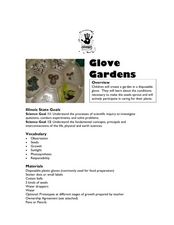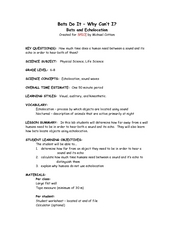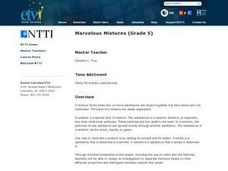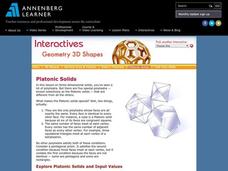Curated OER
T-Shirt Chromatography
Students study about chromatography, a process used to separate mixtures. They see that chromatography is used to detect, separate or purify different substances. This nice lesson plan results in a beautiful t-shirt for each student!
Curated OER
The Envelope System: A Partial Solution
Studnet identify examples of conduction, convection and radiation. They develop an example of a building envelope. They also describe how heat transfer mechanisms can affect home energy costs.
Curated OER
Glove Gardens
Students investigate how seeds sprout. In this scientific inquiry instructional activity, students make predictions on which seeds will grow the fastest and observe the seeds over a period of time. Observations are recorded into a...
Curated OER
Buzzing Bee's Wardrobe
Students investigate the anatomy of honeybees. In this anatomy instructional activity, students research the physical characteristics of bees and discover what they do. Students create a model of a honeybee showing the correct anatomy.
Curated OER
Bats Do It-Why Can't I?
Students explore echos and how they are utilised in navigation. In this sound lesson students calculate the amount of time between a sound and its echo.
Curated OER
Marvelous Mixtures
Fifth graders design an experiment in which they separate mixtures. In this mixtures lesson, 5th graders define mixtures, solutions, solutes, and solvents. They watch a video, complete worksheets, and perform an experiment to separate...
Curated OER
Dinosaur Tracks: From Stride To Leg Length To Speed
Students determine the relationship between leg length, stride length, and speed in humans and bipedal dinosaurs. They collect data and graph these human characteristics then use actual data collected from dinosaur track pads and fossils...
Curated OER
A Day In My Life
Students brainstorm how they can conserve energy in their daily lives. For this energy lesson plan, students discuss how they use energy and ways to conserve it.
Curated OER
Percussion Instruments and Pitch
Students play string instruments to discover how the pitch changes on various string instruments. In this pitch lesson, students listen to video clips and play an online music game. Students become familiar with music...
Curated OER
Bug Sweep
Students observe and categorize insects. In this insects science lesson plan, students create a bug catcher out of a coat hanger and plastic bag, then collect bugs from the schoolyard. Students count and categorize the insects according...
Curated OER
Red Hot Resume
Students listen to a "Help Wanted" story, paraphrase the story, and discuss vocabulary. After reading the story again, students complete a worksheet replacing the vocabulary words with their own words so that the story makes sense to them.
Curated OER
Measure Up!
Students examine parallax and angular measurements. In this investigative lesson students calculate distances of objects and map their results.
Curated OER
and and Ocean Views of Earth by Remote Sensing
Young scholars explain how satellites help scientists to see more than with the unaided eye and how Landsat technology works. Students identify vegetation and fire sites in the rainforest and detect erosion along rivers. They are able to...
Curated OER
On Thinning Ice: An eco-theatre production about climate change
Young scholars investigate the causes and possible consequences of climate change in the north, and realize their choices and actions can help reduce climate change. Some of the skills involved in the instructional activity are...
Teach Engineering
The Advantage of Machines
Show your students how to make their work easier. The first lesson in a series of 10 introduces the class to work and the way simple machines can be make work easier. The simple machines scholars can find in everyday items are...
Teach Engineering
Density and Miscibility
The liquids did not mix — so what do density columns have to do with it? The seventh part in a series of nine provides the theoretical explanation of why density columns do not mix. The lesson covers the topics related to...
Orange County Water Atlas
Location, Location, Location…
Young geographers discover not only how to read and recognize coordinates on a map, but also gain a deeper understanding of latitude and longitude and how climate changes can vary significantly across latitudes.
Teach Engineering
Cell Membrane Structure and Function
Teach your class how to get out of a cell — or break in. The third installment in a seven-part series introduces the class to cell membranes and their functions. The lesson plan includes information to present to the class,...
Teach Engineering
Inside the DNA
Get your class to take a closer look at DNA. Pupils conduct research to determine the methods used by scientists to analyze the molecular structure of DNA. The class members investigate different types of molecular imaging along with gel...
Teach Engineering
Concentrate This! Sugar or Salt...
Heat up your lessons on boiling points. The resource provides a three-part activity: first, groups find the boiling point of solutions; second, they create boiling point curves for salt and sugar solutions; and third, they mix a solution...
Annenberg Foundation
Geometry 3D Shapes: Platonic Solids
From polyhedrons to platonic solids, here is a lesson that will have your classes talking! As an introduction to platonic solids, scholars cut and fold nets to create the three-dimensional solids. They use an interactive component to...
Annenberg Foundation
Geometry 3D Shapes: Surface Area and Volume
Whether you wrap it or fill it, you're using geometric concepts. Classmates use an interactive approach to learn how to find volume and surface area of cylinders and prisms in the second lesson in a five-part series. The online lesson...
Curated OER
What Does It Matter?
Students define matter, the chemical properties of matter, and the physical properties of matter. They name physical and chemical properties of matter (by classifying using a Tree Map). Students determine the mass, volume, and density of...
Curated OER
Naturally Magnetic Elements
Students explore naturally magnetic elements. In this magnets instructional activity, students examine the periodic table of elements. Students discover the parts of an atom and determine which three elements are magnetic.























